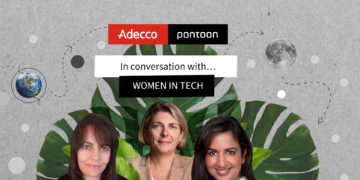In Conversation With: Women in Transformation
Blog
.
In the latest interview in the “In Conversation With” series, Corinne Ripoche sat down with industry leaders Rani Yadav-Ranjan, Head of Technology and Innovation at Ericsson, Virginie Boucinha, Head of Global Transformation at Sanofi, and Reshma Ramachandran, Group Head of Transformations for the Adecco Group, for a lively conversation about Women in Transformation.
The women executives discussed leading major business transformations, meaningful engagements in virtual settings, the importance of having a diverse team and creating a culture that fosters innovation and change. This conversation showed the commonality across industries, initiatives and mindsets to encourage women to pursue opportunities that enable them to lead and grow to their fullest potential.

Corinne Ripoche, CEO Adecco Americas and Pontoon global: Thanks to you all for being here today!
Post-COVID, there will be an acceleration in business transformations, while at the same time technology continues to enable transformations to go faster. I think it’s a powerful combination for us to have this discussion today with two experts in transformation and one expert in technology, a combination that I’m sure will give a lot of insight to people on the topic of transformation.
On top of that, I love seeing strong female leaders around me today on this topic, one that I am so passionate about. I am also extremely proud to welcome you to this virtual roundtable because we are people from all over the world – Silicon Valley, Paris, Zurich, New York. It’s quite exciting. To begin today, let’s start with why diversity plays a key role in business transformations.
Why is diversity, including gender, important when leading and executing a major business transformation?

Reshma Ramachandran, Global Head of Transformation, Adecco Group: Typically when doing a transformation, we are moving out of the old frame and into the new frame. Without a diverse team, we have one line of thought – we are stuck in linear thinking. Diversity, for me, is about being diverse in thought. When we have a diverse team from different places who have worked in different industries, there is a cross-functional team setting (gender, nationality, demographics) that allows for diversity in our thought process, so that we are not looking at everything from a linear point of view. In my experiences, in both Adecco and my past roles, I’ve seen that wherever there is diversity in thought, there is a more successful transformation.

Virginie Boucinha, Global Transformation Office Head at Sanofi: The team that led our recent transformation was built with very different profiles, ages, backgrounds, and experience. They were all unique.
The beauty behind having a diverse team was, as Reshma mentioned, voiding linear thinking in the transformation process. This built a nice dynamic within the team because everyone saw the value in one another’s viewpoints and were able to challenge ideas. Once the trust is built among the team, the outcome is always stronger. We’ve demonstrated this over and over, and there is enjoyment. That connection and ability to help each other remains a resource for the entire team. It is a matter of building resources not only for the future but for the company at large.

Rani Yadav-Ranjan, Global Head of AI Technology & Innovation at Ericsson: We have around 300 data scientists and engineers in five geolocations; Silicon Valley, Santa Clara, Montreal, Sweden, and Bangalore. As imaginable, when you have geo-specific teams, the diversity is more gender rather than nationality. I believe diverse teams have their own strength and power that they bring. Besides the cultural nuances, it’s the knowledge and how they perceive a certain problem. I believe diversity also brings faster innovation.
Corinne Ripoche I agree. I feel that successful transformations come from different angles. The diversity of the team is bringing different types of approaches. It’s key for adoption. To be successful, you must design, onboard, adopt, and tackle with different approaches through a diverse team.
What are important traits of successful transformation leaders?
Rani Yadav-Ranjan: Leaders need to have empathy and humanness. I think transformation starts with a speak-up culture. These values, above anything else, need to be put in place. As Virginie mentioned, trust is essential for a successful team. This new workforce has been globalized. This pandemic has given everyone the opportunity to connect on a daily basis. Our thoughts are being melted into one. A great transformation leader needs to understand that the company has to change and that doesn’t mean that the values need to change, but the company and the process, the way we work has to change.
Reshma Ramachandran: Empathy, I would say, is the most talked-about skill. With empathy, when you want to feel the experience of another person, it takes a lot of courage. Many people will not go through the same experiences as one another, and it is difficult to build the courage to say when someone has a bad day, for example, “I do not understand or feel the same experience as you, but I am willing to take the chance to see from your point of view.” At Adecco, I am very happy that we have a culture that is comfortable with speaking our minds openly and discussing issues without worrying about the consequences.
A trait I would add to transformation leadership that is highly underestimated, in my opinion, is resilience. Transformation typically involves a lot of change, which can be a discomfort for the people in the organization. Resilience becomes very important because it is okay to have a bad day, but it is more about how fast you can bounce back from that bad day.
Is your leadership style consistent or different with each transformation?
Virginie Boucinha: No, they’re not changing at all interestingly because you need to be authentic. The more you do it, the more willing and courageous you are to go in a certain direction because you get excited, because you are convinced to drive the change.
Another important other trait is humility. That’s the trait I am most looking for in today’s transformation leaders because we need to be really willing to have the empathy to listen to what people are saying, to observe and not intervene. You need to have the courage to say “OK this is working” or “this is not working and maybe I need to pivot and then go again”. It takes bold humility and courage to pivot where needed.
Corinne Ripoche: I love these traits: empathy, humility, courage. Female leaders, please be courageous and use your empathy and emotional intelligence. Humility is much better than the ego, super simple but so effective.
People and culture play a key role in transformations, though culture cannot be built overnight. How do you cultivate a culture that will last and prosper with changes?
Virginie Boucinha: It’s a very important question, and one I’m not sure we have all the answers to. So, what is culture? Culture is the way people act. People act in a certain way because they have beliefs. Culture in an organization is how the business acts and believes: it’s how people think, how they decide, and how they operate. Culture lets you know how you work together, how you process, how you make decisions. What are the criteria that are driving your business decisions?
This is not prescriptive; it is what people believe is the right way to do things. When you drive a cultural change or when you want to work on your culture, it’s very important to understand why people behave the way they do. What are the beliefs leading to those behaviours? From there, we can build and expand on the strengths we really want to see more within our organization. It’s much easier to expand your strengths than focus only on things to improve.
However, you can be very specific about a couple of things you want to change in the way the organization is working. Communication is great, but most importantly people will react to seeing how their leaders act and communicate, that’s where you will gain comprehension and addition for most of the organization. We have several examples of our current CEO doing this and really leading this way.
Reshma Ramachandran: Personally, I believe that when we talk about the transformation of organizations, it’s typically the transformation of the culture. As Virginie said, it’s the unsaid part it’s a belief system. This is not something that we can write and post on the Intranet and say now this has become the culture.
From that perspective, I would say Adecco is no exception. We need to look at our ways of working our culture and I think Virginie covered it all in saying it’s not about what we say, it’s what we do. There are a lot of strengths that we bring in. We have a great culture. How do we build upon it to take us to the next level? Then, how does our leadership team live by it? I think it truly plays the centre-stage role in the transformation.
How has a virtual setting affected transformations in the last year?
Rani Yadav-Ranjan: At Ericsson, our hiring didn’t stop. Our onboarding didn’t stop. We went from having an in-person framework in place for onboarding classes to needing to onboard new people completely virtually. For our transformations, we cannot just say we’ll push hiring back two months because two months became six months and then two quarters and four quarters. Having culture coming through the internet is a change too. Your senses are different when meeting someone virtually instead of in person. You’re reading me with only a few dimensions but there’s so much more of me. If we’re going to transform any organization, we must keep those nuances in mind.
Corinne Ripoche: Yes, I think it’s an important point. What the world is giving us today is that we have to find a new way to co-create, iterate, and engage virtually because the beauty is that we are able to put people from anywhere in the same meeting to co-create together and to iterate together. This was giving us the speed of the transformation, as well as a feeling of spirit or mood shift in the team. Beyond a screen, you can see us but not everything. It can become a bit more difficult, and the co-creation and iteration is not yet there. I hope that tech companies will continue to innovate and to give us new opportunities to co-create via Zoom, Teams, and other tools that you and I are now used to working with every day.
How do you measure the success of transformation?
Reshma Ramachandran: For me, how I’ve always defined the success of transformation and I would say more so in the past five years, due to introduction to a digital world, is to start with new growth. How are we creating new growth areas and leveraging technology to improve those growth areas? Then, we move onto positioning the core. How are we repositioning the core, but the same core cannot be moved forward in the same shape or form. Finally, most of us are still working for public companies, so we have shareholders. There is an emphasis on financial performance with purpose. We need to have financial performance, but not forget to make the future work for everyone. Whether we reposition the core or talk about new growth areas, it’s about creating reliability around the world and not forget about our own employees/colleagues. How do we engage with them? How high are the engagements? Those are the three things that I would use to anchor our success for the organization around the transformation.
Virginie Boucinha: I like to define it as achievements because I think it never ends. Any transformation should be linked to business performance. To start with, there are some KPI’s that would be a little bit more financial, like market share, but in the end, it’s what you’re trying to change. There is the performance and growth leverage and capturing how you get there. There are also two other aspects that you always want to measure, it’s like a triangle that you’re always trying to move around: business, processes, and culture. All of it has to move in the same direction. It’s good to be competitive, but you also want to make sure your processes flow together to avoid burnout.
One achievement for me would be to really understand what are the iconic processes that I need to change that fuel that transformation that I’m trying to do. We spoke about people and culture, and one measurement or achievement would be stories from the business that align with your changes and transformation. Once you have a consistent pattern going in one direction about how we do things, then I think we’ve achieved an important milestone in our transformation.
Rani Yadav-Ranjan: I think Reshma and Virginie have really covered two ends of the spectrum. For me, it’s all about balance. If we’re going to be talking about transformation and we’re talking about impact, which are KPIs, we are only stewards each of us in our roles here for a period and we want to leave the role and the organization in better shape than we found it. That is the essence of why we’re usually brought in.
What advice do you have for C-Suite when embarking on a transformation journey?
Virginie Boucinha: I would say to make sure to have a diverse team around you. It keeps you from complacency because when you’re getting to senior-level you’re not on the front lines anymore. You sort of lose that connection with reality. The more diverse teams you build all around the organization, the more reality feedback you will get. There’s not one truth or one reality. There are different perspectives. You need to integrate those, as that’s how people will relate to what you are saying.
The other thing I would say is to own time. Transformation takes passion, so as much as you need to be a very strong driver and have will, speed is not necessarily always great. You can make fast decisions but analyze and observe. Time pause will be critical. The organization and the external world tend to push us to be very task-focused, very “next milestone”, and it takes a lot of strength to say, “No, this is not the time. Now we need to do this. We do not have a full view.” So own time and do not think you have to rush everywhere.
Rani Yadav-Ranjan: You need a diverse board. You need to have diverse opinions. In fact, you need somebody in the room that will challenge and bring a different perspective because of the different experiences we all have. I’ve been somebody who has always been disruptive in many industries from banking to e-commerce, and now in the telecom space. My reference points are going to be different, but it’s important to listen. I would say appreciate and respect the fact that without a diverse group around you, you probably cannot make the changes necessary for the next generations, for the next 10 to 20 years.
Reshma Ramachandran: I have a similar perspective but in a different way. I think a lot of companies and CEOs want to transform. Transformation is appealing because it’s for the better. However, I think what most CEOs and leaders do not necessarily do is a transformation readiness check. Transformation takes a lot of stamina and a lot of energy. You need to make the same decisions consistently. You must undo what you have been doing so far. I’d simply equate it to weight loss; for example, before every summer in the next four months, I want to lose some weight. I must be consistent to see any results. You will lose some weight and gain it back immediately if you are not consistent. I think it’s a very good analogy because it’s just consistency and discipline.
Corinne Ripoche: I always say that the transformation journey is a roller coaster journey. If you do not have consistency and the right people around you (a diverse team), it is difficult. You must remain resilient to say I know what my goal is, I know where I want to go. You have to keep your North Star. Do not change your North Star, even if you experience the roller coaster journey on a daily basis.
I have my last question for you about female talent.
What advice do you have for female leaders entering this space?
Reshma Ramachandran: The advice I give to any young girl: Do not have any self-limiting. I grew up in India with less and without power. But I went to the best universities, changed my career, lived in 13 countries (so far), and changed my career just because I wanted to try new things out and it’s all because I overcame self-limiting beliefs. What I wouldn’t have gotten had I succumbed to those self-limiting beliefs. Do not succumb to that because you can reach wherever you want to reach.
Virginie Boucinha: I would tell them to please listen to your intuition, to your gut feeling. As women, we’ve learned to have so many perceptions of how we should be behaving and doing things so early on that we tend to shut down that inner voice. It is important to listen to your gut feeling and what Resha was describing of not being self-limited. Listen to that inner voice. Let it speak because it’s always right. I think it always gives you the courage in the roller coaster you were describing which we all go through. That’s where you know where your core is and that’s where you know where you need to be. You can stand firmly in the wind.
Rani Yadav-Ranjan: Find your community of female leaders and peers. You know, Corinne and I are in C200 together. C200 is an organization of women, by women, for women, to help each other as leaders and want to grow. I think that goes back to what everybody has said here today that we can grow and change at every level. I would say that I am a firm believer in paying it forward. I believe the biggest thing is to remember your ambition is within you and you’ll stop yourself when it’s right. Don’t believe that your journey is something you have to go on alone. Find a mentor that you respect or emulate. It doesn’t matter the gender. Make them your solution team and find a team of people that will be your champions and your solution when you have problems. We all have problems, and we somebody to turn to. Do that if you’re starting out early in your career, I would say. Take as many chances as possible that you can fail fast. Fail fast, fail frequently, and move on. Pick yourself up, dust off your knees, and get back on that bike. You’re the only one who can stop yourself from moving forward. It all goes back to not forget that you can never have it all, but you will make choices and whatever choice is right, it’s going to be the right choice for you because that’s your choice. Going back to what Virginnie said, you know, trust your gut; the science is there for that.
Corinne Ripoche: I think you all gave fantastic advice to women. I agree, clearly trust yourself, believe in yourself, and do not wait.
About our panellists:
Virginie Boucinha is Head of the Global Transformation Office at Sanofi. Virginie joined Sanofi in France in 1991 where she held various financial roles before moving through strategic positions in sales, marketing, and Business Excellence. In her current role, she focuses on major organisational transformations through business, culture, and process pilots and improvements.
Rani Yadav-Ranjan is Head of Ericsson’s Global Artificial Intelligence Accelerator (GAIA) Technology & Innovation. At GAIA, she outlines and drives strategy and execution of artificial intelligence functions including global operations, setting up frameworks to trigger and capture internal and eco-system innovation and injecting it into Ericsson’s business units and market functions competence.
Reshma Ramachandran is Global Head of Transformation at the Adecco Group in Zurich. Having held many roles in transformation, technology, and consulting, Reshma has been responsible for driving change and leading digital transformations while leveraging the power of data and innovative business models. She is a champion of diversity & inclusion, focusing mainly on inclusion and belongingness in organizations and is an advocate for more women in STEM.
Corinne Ripoche is CEO of Adecco Americas and Pontoon global. Corinne started with the Adecco Group in her native France in 1993, and throughout her career has specialized in leading major business transformations while moving through senior sales, operations and product positions in Europe and America. Corinne is an advocate of women leadership and is a Global Council Member of C200, Advisory Council Member of Women Business Collaborative, and a member of Paradigm for Parity.
Related Post
Corinne Ripoche sat down with industry leaders Pavan Kochar, CEO and Co-Founder of Certree, and Lesleigh Seagram, Global Head & VP of Fieldglass Partner Channel at SAP, for a conversation about Women in Tech.
In the first of this ...
Similar Resources
Corinne Ripoche sat down with industry leaders Pavan Kochar, CEO and Co-Founder of Certree, and Lesleigh Seagram, Global Head & VP of Fieldglass Partner Channel at SAP, for a conversation about Women in Tech.
In the first of this ...
Corinne Ripoche sat down with industry leaders Pavan Kochar, CEO and Co-Founder of Certree, and Lesleigh Seagram, Global Head, VP Fieldglass at SAP, for a conversation about empowering Women in ...




